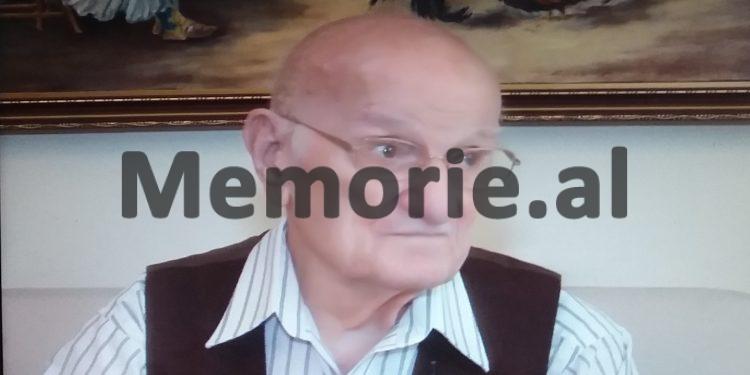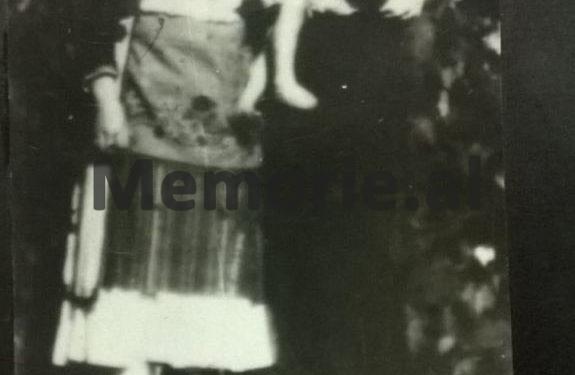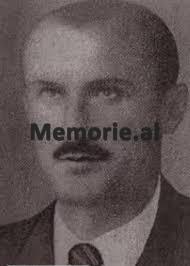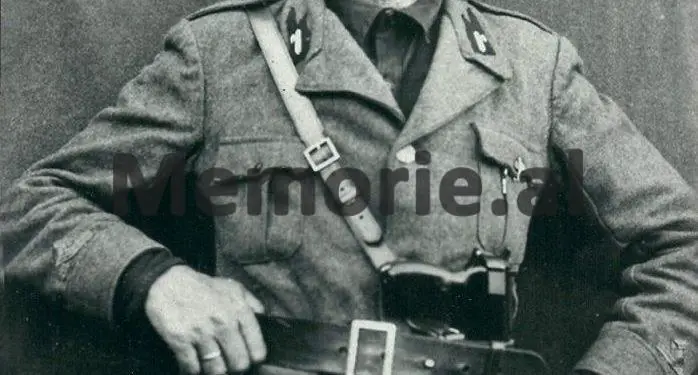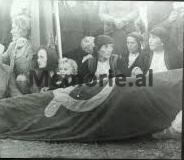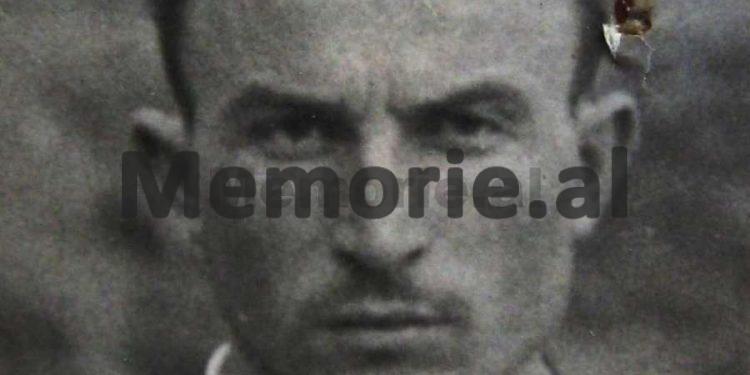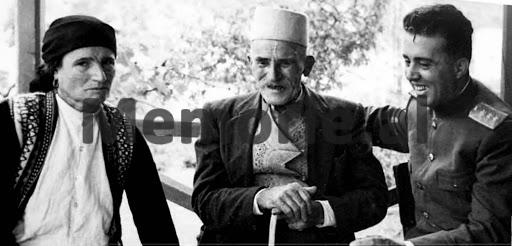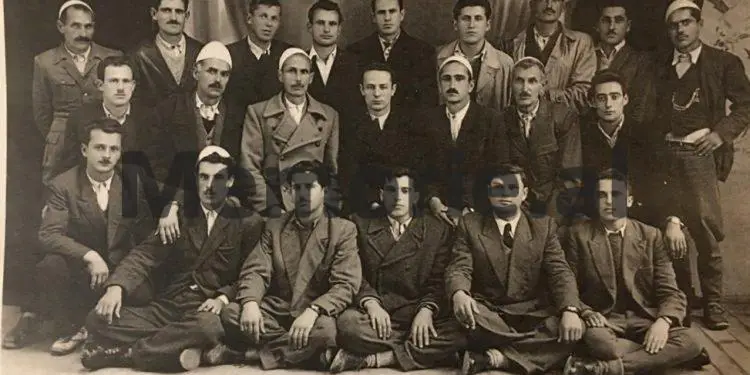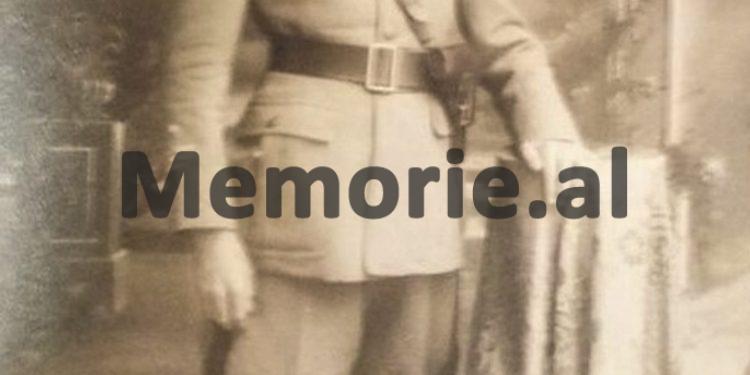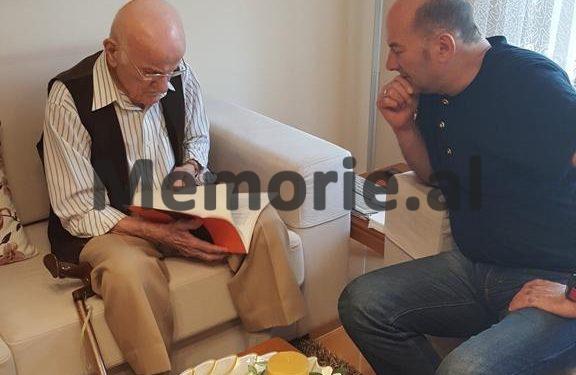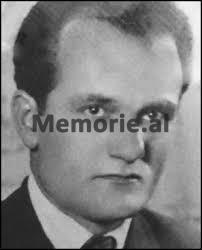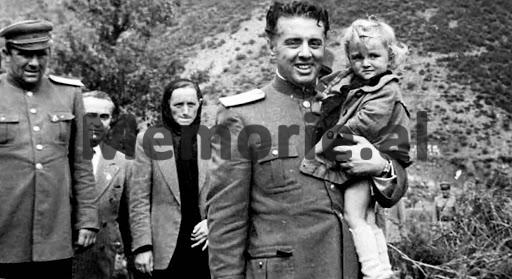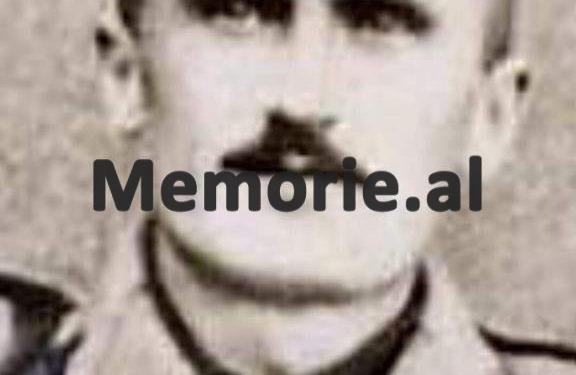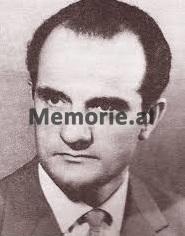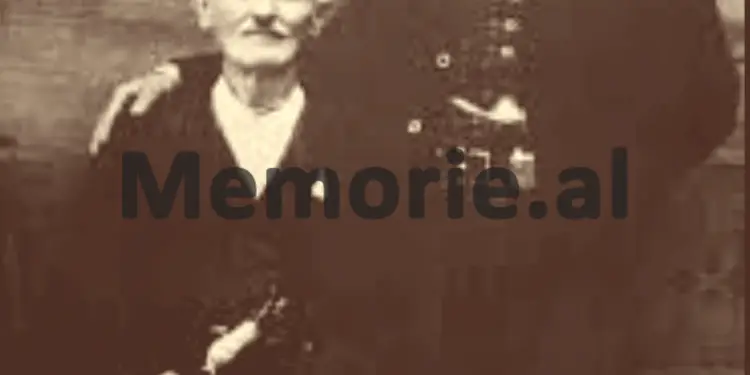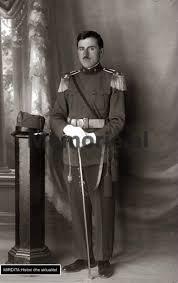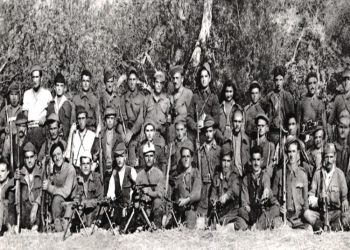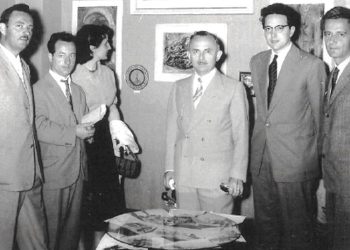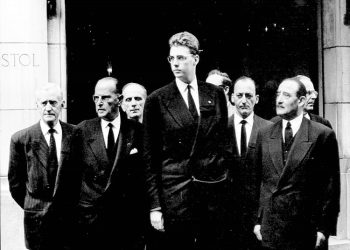Dashnor Kaloçi
Memoria.al publishes the rare and unknown story of Ndue Mëlyshi from Mirdita, where his father, Gjoni was the bayraktar of Kthella, while his brother, Nikolla during the period of the Bird Monarchy served as a soldier in the Royal Guard, and the son their uncle, Frroku, in the Gendarmerie weapon. How the roads were temporarily divided between the two cousins during the occupation of the country, after Frroku fought against the partisan forces in the South of Albania and at the end of the War, he joined Gjon Marka Gjoni in the city of Shkodra, taking revenge for the murder of Lieutenant Colonel Adem Boletini (son of Isa Boletini), from the communists, while Nikola became a partisan, joining the VII Assault Brigade commanded by Gjin Marku, Ramiz Alia and Adil Çarçani, fighting all the way to Visegrad, Yugoslavia. Ndue Mëlyshi’s rare testimony of how he was forced to flee in 1947 with his brother Captain Nikoll Mëlyshi, Pal Mëlyshi’s father (the main character in the movie “Operation Fire”) after the communists burned down the towers and the whole family with women and children were interned in the camps of Kruja, Berat, Tepelena, etc. How did Nduja stay in the mountains of Mirdita in the struggle with the Pursuit Forces until ’49 when he was forced to flee to Yugoslavia together with 53 members of the anti-communist resistance, after the murder of Bardhok Biba, after his brother Lleshi and uncle’s son were shot , Frrok, whose body was cremated with kerosene to terrorize the people of that province. Ndue parachuted into Albania after being trained by the Americans in the Italian camps and wandering through the mountains of Mirdita and Puka until 1952, when he finally left Albania for Italy, Germany and the USA, where he lived until in 1992 when he first returned home to his family (living in the city of Shkodra to his daughter, Bardha Mëlyshi, without returning to the US from 2014) until he passed away on July 31, 2020, at the age of 109 and was escorted yesterday to his last home.
“Bardhok Biba was sentenced to death by our organization and I am sorry that I did not have the opportunity to kill him with my own hand, as he was Stalin’s puppy and not Albanian.” After the answer given by Mark Jak Bajraktari, Major UDB arkarkiç, did not continue the process of questioning our group of Albanians and closed it at all. This made that a few days later, in June, in the camp of Nis where we were, the UDB Major, Cedo Mihjovic came and called Ndue Pjetër Gjonmarku, Ndue Bajraktari, me (Ndue Mëlyshin), Mark Dodë Lleshjan, Marka Jak Bajraktari and Pjetër Kol Preçi. After calling us in the office, he told us that during the period we were in camps and prisons, we had gone through difficulties, because according to him, the situation in Yugoslavia was still turbulent, but we should not be too upset, as the main thing was the fact that we were alive, because in not a few cases our lives were in danger. After this introduction, he went directly to the topic, telling us that he had personally intervened in our case and had talked to the Ministry of Interior, to release us from prison, on condition that we form six small groups with by three people and to enter Albania with secret missions ”. The man who speaks and testifies for Memorie.al is Ndue Mëlyshi, originally from Kthella e Mirditës, a former member of the anti-communist resistance forces, who fled Albania in 1949 and parachuted into Albania after being trained by the Americans in the camps of Italy. Returning to Albania in 1992 after four decades of emigration, Ndue Mëlyshi, from 2014 lived in the city of Shkodra with his daughter, Bardha Mëlyshi, until he passed away on July 31, 2020, at the age of 109 and yesterday on August 1 was escorted to the last apartment. Although he carried on his shoulders more than a century and a decade of his life, even with endless deprivations and vicissitudes passing almost half a century away from his family, wife and three daughters he left very young and found them with children , memory and memory never betrayed him until the last minutes when he passed away three days ago, (July 31, 2020) sitting in his armchair browsing the daily newspapers. Recently, Memorie.al managed to get a long interview with Mr. Ndue Mëlyshi, (recording it with video) in order to publish it on August 7, on the occasion of the sensational event of the murder of Bardhok Biba, an event that terrorized Mirdita and led to the departure of him and 53 members of the anti-communist resistance from Albania. During the conversation, his extraordinary memory as a “living folder”, sometimes came to his aid and notebooks where for years he has chronologically thrown pieces and moments from his troubled life, or the book “Mountain Life”, which he published several decades ago when he was in political asylum in the US. Conveying to the Mëlyshi family the condolences for the loss of their beloved man, in this article we are publishing in full the whitewashed interview we received recently (with the unstinting help of his daughter, Mrs. Bardha Mëlyshi), completing even with some of his notes.
Mr. Ndue, at the beginning of this interview, before we ask you and tell us briefly about your family background, how old are you?
I am 109 years old, here I have it and you can see the passport, date of birth 1911, but with the records found in the books of the Church where I am registered, I figure two years older, so I was born in 1909 and it falls to I am 111 years old.
What is the origin of your family?
We are from Thkella (Kthella) of Mirdita and our father, Gjon Mëlyshi, was a bayraktar of Thkella as if they had not told the head of the tribe, who ruled all those villages that the bayrak summed up.
During the time of the Zog Monarchy, how were the relations of your Mëlyshi tribe with that regime?
Many have been good as we have seen our work without interfering in the affairs of government policy.
From the Mëlyshi family, did he have government positions and functions during the time of the Monarchy?
We did not have any positions or functions, but the military of the Zog Monarchy was my brother, Nikolli, who served until the Royal Guard of Zog with the rank of lieutenant and then as captain. Likewise, our first cousin (our cousin), Frrok Mark Mëlyshi, was an officer of the Monarchy and both, together with my Nikolli, took part in the resistance against the Italians on April 7, 1939, when he was attacked. Albania from fascist Italy. Frroku was in Durrës with the volunteer forces and took part there as much as possible to resist the Italians, as he had all that army Italy and Zog with that army he had could not face them, because there would be bloodshed and great.
During the period of occupation of the country, 1939-‘44, what position did the Mëlyshi family take?
During the period of occupation, both Frroku and Nikolli were officers in the Albanian National Army that was then and participated in the Italian-Greek war with the Albanian battalions that went to the front and later deserted with Spiro Moisiu, Prenk Perviz, etc. My brother Nikolli, became a partisan in Enver Hoxha’s National Liberation Army and was in the VII Assault Brigade with commander Gjin Marka Toma, he fought until Yugoslavia. Nikolli, as a former officer has held senior positions in the Brigade Headquarters of Gjin Markut and with the rank of captain. Frroku was also with the Gendarmerie and fought together with Major Dod Nikolla, against the partisan forces in Southern Albania, and from the end of the War he was together with Gjon Marka Gjoni in Shkodra and was one of those who took revenge for the murder of Lieutenant Colonel Adem Boletini (son of Isa Boletini) and Major Ndrec Prenga from the communists of Vasil Shanto. After returning from Yugoslavia, Nikolli was on duty at the Officers’ School in Tirana as a lecturer, while Frroku did not leave Albania, but fled to the mountains with Mark Gjon Markut forces, as the communists wanted to arrest him because he had fought. against them.
What did you personally, during the period of the Monarchy and the conquest of the country, deal with?
Since my brother, Nikolli, has always been on military duty away from our family, I was forced to stay home in the village, until 1947 when I escaped to the mountains.
Why did you run away?
I fled because after the end of the war, the communists did not look at us well, as they did not easily forgive our uncle’s son, Frrok, who had fought against them and was on the mountain since the end of the war. For this reason in 1947, although Bardhok Biba tried to defend us because Nikolli’s son, Pal Mëlyshi was with the communists, we burned down our towers, as we had gone up the mountain on the run. Brother Nikolli also escaped with us, as they also wanted to arrest him, even though he was a military leader at the Officers’ School in Tirana, but he was informed by a loyal friend of his and he was able to leave Tirana secretly and came to Mirdita together. with us.
When you went to the mountains in 1947, who did you leave at home and what happened to your family?
When I went home to the mountain I left my wife, Mara, daughter of the family of Gjon Marka Gjoni and three daughters, where the eldest was Bardha 7 years old and the other two after her, Lizita and Agetina, two years apart one from next. They first took them and sent them to Shpal of Mirdita, then they were interned in Lezha and then in Berat and from there to Tepelena, where they stayed until that terrible camp was closed. Then they sent them to exile in the village of Bardhej in Shkodra and there the girls were stabilized and raised under the care of their mother, the daughter of the Gjonmarkaj tribe, helping her people as well. But they took off very badly, working on the hardest jobs and telling you that you are the saboteur’s daughters.
How long did you stay in the mountains on the run and when did you escape from Albania?
I stayed in the mountains until Bardhok Biba was killed in early August 1949 and then I was forced to flee to Yugoslavia, as the pursuit of communist forces against us is known to be strong after Bardhok’s assassination, for which I did not agree with and did not agree to sign for his murder.
Why did you not agree?
If nothing was gained with the assassination of Bardhok and that would only bring us harm, as it was known that the revenge of the communists against our families would be strong, as it happened and in fact with our entire families Mirdita, where they were shot 14 men and hundreds more were imprisoned and exiled. One of the 14 men who were shot in revenge for Bardhok’s murder was my brother, Llesh Mëlyshi.
Why did you decide to go to Yugoslavia and not to Greece?
Our group found it impossible to get out to Greece, as it was a long way from the mountains of Mirdita to the South of the country on the border with Greece, as we would fall into the ambushes of the Pursuit Forces and would have great losses. So it was decided to leave Yugoslavia, because in 1948, when Yugoslavia broke up with Russia, the word spread here that they were connected with England and America, and from Yugoslavia it became much easier to move to the West. Based on what was being said at the time, many groups of anti-communist resistance fighters stormed the border, as it was said that there in Yugoslavia political immigrants moved freely and without any problems. Thus, at that time, they found political asylum in Yugoslavia, as well as a large group from Mirdita, led by Marka Bib Vokrri, Ndrec Lufi, Bilal and Halit Kola, etc.
What route did you take to escape to Yugoslavia?
After the murder of Bardhok Biba on the evening of August 7, 1949, we all gathered in Shqopa e Munella and from there we passed some villages and hamlets of Mirdita, we went to the Kaçinarir and Kushnen Mountains and we arrived in the village of Shkoza. From there in Fushë-Arrz, Kryezi, in the Kryeziu and Dardhë Mountains, where we met with Pal and Ndoc Mirakaj and their group who were resisting in that area. After a short rest there, they supplied us with food for two days and gave us 11 of their loyal men to guide us on our way to Yugoslavia. Pal Mirakaj and Mark Zogu accompanied us until we approached the border and on August 17, a total of 53 men left for Yugoslavia without any dams.
After leaving Yugoslavia, where did you surrender?
The Yugoslav border guards escorted us to their command in Babaj i Boga and there, after taking our weapons, they gave us bread and cigarettes and registered us all, led by Ndue Pjetër Gjonmarkaj, who we told was the leader of our group. That same night, some UDB officers dressed in civilian clothes came to us and with two trucks took us all and sent us to Gjakova, where after we rested for 24 hours, they took us again and sent us to the Prizren prison where they kept us for 23 days. isolated, interrogating us all one by one. We all issued a statement that we were political emigrants and had come to Yugoslavia because our lives were in danger, as the communist regime in Tirana was following us.
But then where were they sent?
From there we were all tied up and sent to the large prison in Nis, where there were about 2,000 prisoners with sentences of up to 101 years, but under Yugoslav law at the time, that sentence was reduced to 21 years.
How were they treated in that prison, what were the conditions?
There in that prison all the convicts without exception were forced to work 8 hours a day and for those who worked the food was not bad, there were 600 gr. bread per day and the dish was not bad. For those who did not want to work, the food was poorer. There were also disciplinary punishments with isolation in dungeons called “Bela Kuce”, for all those who opposed the regulation and the police.
How long were they held there and where were they sent after?
They kept us there until June 1950. But first there in Nis in April, UDB officer Zivko Carkic came and interrogated us all one by one. He mostly dealt with Ndue Pjetër Gjomarkaj, who we had as the leader of the group, and he forced him more by asking him about the murder of Bardhok Biba, but Nduja resisted and did not accept anything. After Ndues, they interrogated Mark Jak Bajraktari who told them: “Bardhok Biba was sentenced to death by our organization and I am sorry that I did not have the opportunity to kill him with my own hand, as he was a puppy of Stalin and not Albanian ”.
After what answer did Mark give, what happened?
After the answer given by Mark Jak Bajraktari, Major arkarki nuk did not continue the process of questioning our group of Albanians and closed it altogether. This made that a few days later, in June, in the camp of Nis where we were, the UDB Major, Cedo Mihjovic came and called Ndue Pjetër Gjonmarku, Ndue Bajraktari, me (Ndue Mëlyshin), Mark Dodë Lleshjan, Marka Jak Bajraktari and Pjetër Kol Preçi.
What did the UDB major tell you?
After calling us in the office, he told us that during the period we were in Yugoslavia in the camps and prisons, we had gone through difficulties, because according to him, the situation in Yugoslavia was still turbulent, but we should not be too upset, because the main thing was the fact that we were alive, because in not a few cases our lives were in danger. After this introduction he made the subject by telling us that aim had personally intervened in our case and talked to the Ministry of the Interior to release us from prison, on condition that we form six small groups of three persons and to enter Albania with secret missions./Memorie.al




